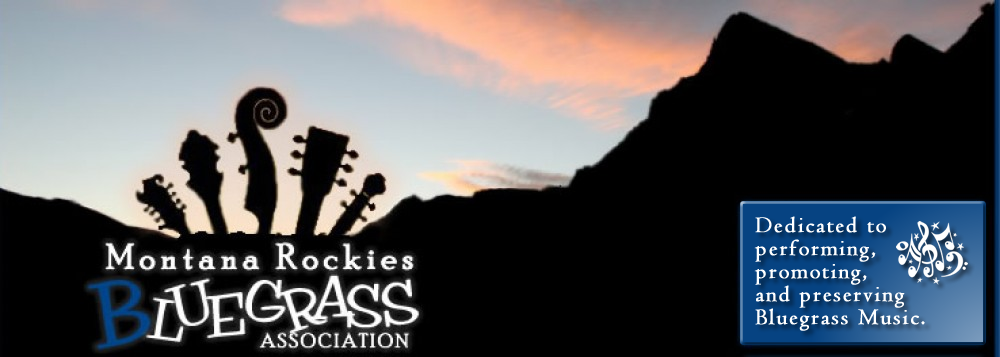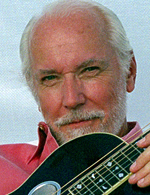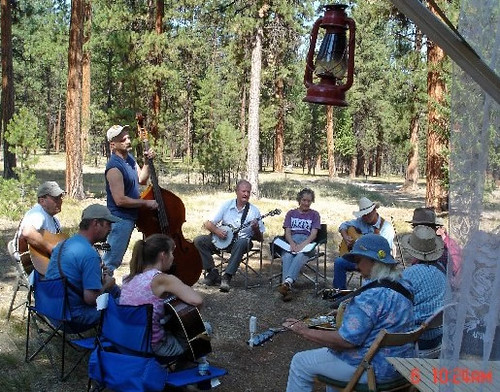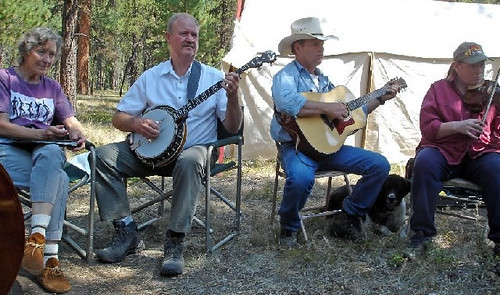An uncertain Top Hat – Steve Garr’s children consider future in wake of owner’s sudden death
By JOE NICKELL of the Missoulian
 |
 |
The children of legendary Top Hat bar owner Steve Garr, from left, Heidi, Nicole, Greta and Nate, spoke about their late father and about the future of the Missoula landmark Tuesday afternoon at the bar. MICHAEL GALLACHER/Missoulian |
The Top Hat has always been a place of many faces. To some, the bar on Front Street has been a low-key daytime hangout, a place where the conversation flows like slowly poured beer and where you’re perfectly welcome to light up a cigarette if you so please. Later at night, it’s been a place where a somewhat younger crowd gathered to play pool and listen to local jam-rock bands, bluegrass ensembles or the occasional touring act.
Whatever was happening on a given night, the crowd at the Top Hat was never homogenous. Rather, it encompassed every walk of Montana life: barely legal drinkers playing pool with grizzled bikers; young professionals and dreadlocked hippies swing-dancing on the dance floor.
It is a place where the walls themselves are lined with memories of the diverse faces that have passed through. Photos of old blues musicians – some of whom count among the most respected and famous in America – share space with bass drum heads donated by rock bands that few people ever heard of in the first place (any Nite Snackr fans still out there?).
But when all was said and done, those many faces were, in a way, simply a reflection of the man who owned and operated the Top Hat these past 21 years: Steve Garr.
Gruff in demeanor and rough in appearance, Garr probably seemed an unlikely ambassador for the place to those who didn’t know him well.
But few casual patrons of the downtown Missoula bar would have ever guessed that behind Garr’s crusty exterior lay the soul of a devoted father whose passion for music and tireless work ethic helped shape the lives of four gregarious, thoughtful offspring – who now find themselves grappling with Garr’s sudden death last week at the age of 62.
Garr’s quartet of kids – twins Nate and Nicole, 32; Heidi, 26; and Greta, 20 – find themselves in the doubly painful position of dealing with the loss of their beloved father and determining the fate of his legacy.
“We are looking at a huge transition either way, whether the Top Hat lives on as a memory or as an institution,†said Nate of Boise. “All four of us have put our blood, sweat and tears into this place with our father. We want to continue to do that to honor his legacy, but he was also fiercely proud of the directions we’ve all taken in our lives. So we’re facing a tough decision.â€
Nate and Nicole (“Colee,†to her friends) can still remember when their dad decided to buy the Top Hat. They were in the sixth grade, and their father was working days as a carpenter and nights as a bartender. The twin siblings still recall the excitement of that time, and the pride they felt.
“I was ecstatic that my dad was going to be a business owner,†recalls Nate.
“Dad was like an old farm owner: ‘You have kids to help with the business,’ †adds Nicole, who now lives in Hawaii. “So we were always here. It wasn’t just Dad’s place; it was our life, growing up.â€
There was certainly plenty of work to be done. Though the Top Hat had existed by that name since the early 1950s, it was in a state of disrepair and neglect by the time Garr and his younger brothers, Scott and Dave, decided to buy it.
“The old, original floor was in storage in the basement at the old Carousel (a former Missoula bar),†recalls Heidi, who was 5 years old at the time. “Dad and his brothers went and got all the wood, planed every piece of it, and reinstalled it.â€
Over the years, Garr – with help from his kids – continued to work on shaping his vision of the Top Hat. Old memorabilia including historical photographs of Front Street businesses, license plates from all across the country, farm implements, artwork and Garr’s softball trophies filled the walls, while Garr gradually upgraded the stage and the bar.
“When we look around at the stuff on the walls, we remember when he found it,†says Greta, the only of Garr’s offspring who still lives in Missoula. “He was so excited when he found those things.â€
In the early 1990s, he found his pride and joy in Wyoming: an antique bar and backbar built by Brunswick-Balke-Collender. Garr spent 10 years refinishing the bar in the basement of the Top Hat before unveiling it for the Top Hat’s 50th anniversary.
“It was important to Dad to serve as a facilitator for the history of Montana,†says Nate. “He loved all this old stuff, and he felt it was important to preserve it and share it – the Top Hat itself, most of all. Every little thing that went up in here that looks to be weathered, Dad touched it, he loved history and wanted the Top Hat to represent a house that can help reflect the history of this place.â€
Garr was also committed to preserving a venue for live music shows. In a town where concert-presenting nightclubs have come and gone year by year, the Top Hat stands as by far the longest-lived place where live music can be heard most nights of the week.
It was that love for music – and respect for musicians – that Nate feels most strongly influenced his own outlook on the world.
“Growing up here in Missoula, we had a very unique exposure to culture and ethnicity that I don’t think a lot of people did,†says Nate. “We didn’t see the bands play on stage as much as we got to know the musicians and where they came from: Chicago, Memphis, all over. They spoke differently from people from around here, and they talked to us with an incredible amount of respect because they and my dad spoke the same language of music. That’s helped me out the most in my life, besides the work ethic he instilled in me.â€
Nicole chuckles.
“He definitely had a work ethic. He was always living nine lives at once around here,†she says. “He was a father not only to us but to everybody in the bar; he was always working on something here or building two homes or working on his Cadillac. He never slept through the night, he would just take a nap and then get back to it.â€
So what of the guy that so many people in Missoula knew – the gruff man who might, if he was in the mood, give you five minutes of his time before cutting you off midsentence?
“Compromise wasn’t really his thing,†says Nate with a loving laugh. “And that’s a hard thing for people to receive.â€
“He always shot from the hip,†adds Nicole. “But if you don’t own a business, it’s hard to understand just how much there is to do. He didn’t waste any time B.S.-ing with anybody, he didn’t have time to be clouded by what other people thought he should do. I know I’m feeling right now that that’s something I want to be better at doing in my own life.â€
Sitting in the Top Hat, surrounded by all those reflections of their father, Steve Garr’s children admit: They just don’t know what’s going to happen from here.
“This (the Top Hat) isn’t an inheritance in the sense that we can just do whatever we want with it,†says Nate. “It’s a huge asset but there are also a lot of liabilities out there and we have to address those first. I have the utmost faith in the capabilities of these three women (Nicole, Heidi and Greta) to not just take it on, but to take it to the level my father probably couldn’t have dreamed of, and make him fiercely proud. But the reality is, we do have limited time. We can’t rush to make these decisions, but there is a clock and it’s ticking.â€
In the short term, the Top Hat is closed, as the Garrs work to sort out their father’s estate. It will reopen for one day on Saturday, for a benefit event to raise money to cover Steve Garr’s lingering medical expenses.
Beyond that, Garr’s children are looking for answers – not only from themselves, but from the community at large.
“We really want to hear from the community as to their expectations of the Top Hat,†says Nate.
He catches his breath, sits quietly for a moment.
“The bottom line is that this is just about as heartbreaking as you can imagine for us,†he says. “It’s our dad.â€
nbsp;
Remembering
A potluck celebration of Steve Garr’s life will be held at the Top Hat this Saturday from 1 to 11 p.m. The event will serve as a fundraiser for Garr’s medical expenses. The event is open to the public, and musicians are encouraged to bring their instruments.
 The influence Mike has wielded is incalculable. From the moment his first solo album, Dobro, was released in 1972, the very sound of the dobro was indelibly and profoundly changed. To borrow from Steve Martin’s assessment of Earl Scruggs’ influence on the banjo: Before Mike Auldridge, no one sounded like Mike Auldridge on the dobro. After Mike Auldridge, everyone aspired to sound like Mike Auldridge. As Rob Ickes noted in his IBMA presentation, “To this day, [Mike’s] tone is the holy grail of contemporary resophonic guitar players.” Rob also particularly noted how Mike stretched the boundaries of the instrument in terms of technique, musical vision and elegant taste firmly rooted in a “less is more” ethic.
The influence Mike has wielded is incalculable. From the moment his first solo album, Dobro, was released in 1972, the very sound of the dobro was indelibly and profoundly changed. To borrow from Steve Martin’s assessment of Earl Scruggs’ influence on the banjo: Before Mike Auldridge, no one sounded like Mike Auldridge on the dobro. After Mike Auldridge, everyone aspired to sound like Mike Auldridge. As Rob Ickes noted in his IBMA presentation, “To this day, [Mike’s] tone is the holy grail of contemporary resophonic guitar players.” Rob also particularly noted how Mike stretched the boundaries of the instrument in terms of technique, musical vision and elegant taste firmly rooted in a “less is more” ethic.



 A sign outside the Top Hat in Missoula. Photo by Anne Medley.
A sign outside the Top Hat in Missoula. Photo by Anne Medley. The Top Hat “was everything to my dad,†Nicole said. “It was a place for him to express music. It was a venue for the fantastic musicians of this country and out of this country as well.â€
The Top Hat “was everything to my dad,†Nicole said. “It was a place for him to express music. It was a venue for the fantastic musicians of this country and out of this country as well.â€


